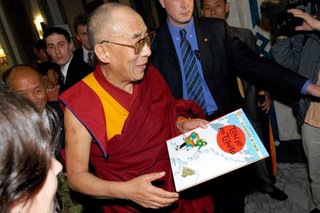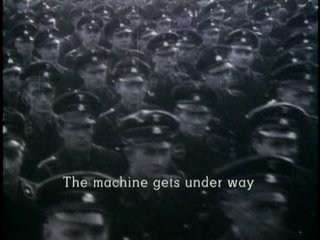In his wistful article at Counterpunch.org, writer John Ross takes a look back at the year 2008.
Yes, 2008.
A Preview of 2008
A Year to Forget
by John Ross
A death sentence for the human race, the end of the Iraq war, a Mafia hit on President-elect Rudolph Giuliani, the assassination of Barak Obama by a deranged Hillary fanatic, a cross-border terrorist attack by Al Qaeda of Mexico, and the massive round-up of Mexicans in the U.S. were some of the highlights that made 2008 one of the most absurdly messy years for the Planet Earth since that orb fell out of the firmament.
Here's a month-by-month round-up of salient events:
JANUARY
The flood of hundreds of thousands of Iraqi refugees tricked into returning to Baghdad by housing czar Ahmad Chalabi's false promises of shelter sparks renewed Sunna-Shiia bloodshed. In response to a series of horrific car bombings, George Bush calls a halt to the projected U.S. drawdown, angering both troops and Republican hopefuls seeking to de-escalate the unpopular war as a campaign issue.
Meanwhile Iraqi Prime Minister Nuri Kamal al-Maliki, whose regime has been plagued by monumental corruption, takes sick and falls into prolonged coma. Chalabi makes a grab for control setting off a wave of car bombings in Baghdad that cost over 400 lives.
In further evidence that global warming is accelerating beyond scientific calculations, a colony of penguins is discovered nesting on a tributary of the Amazon.
FEBRUARY
Al-Maliki dies, apparently poisoned by weapons-grade plutonium pellets. The U.S. blames Iran and threatens to bomb Tehran's non-existent nuclear weapons facilities but holds off at the last minute as Shiias all over the Middle East rise up - some of Saudi's richest fields are in the midst of Shiia populations. Petroleum prices zoom to $150 a barrel as the threat to Saudi production looms.
Venezuela's Chavez, reacting to Washington's threats to attack his ally Ahmadinejad, cuts off oil shipments to the U.S. and signs contracts with China. By the end of the month a barrel of petroleum cost $200.
In a gristly incident at the Bronx Zoo, polar bears eat a dozen of their keepers in what may have been a global warming-related event.
MARCH
Ahmad Chalabi is "elected" Iraqi prime minister replacing the poisoned Maliki. Sunna and Shiia mobs riot in Iraqi cities to protest the convicted embezzler's power grab.
Responding to the renewed instability, Bush extends tours of duty for thousands of U.S. troops who had expected to be rotated home at the end of the month. The order triggers an unprecedented strike by disgruntled soldiers effectively shutting down General Petraeus's war for a week. Bush, whose popularity has slipped to 12%, threatens to charge the strikers with treason. Blackwater Worldwide is sent in to scab.
Meanwhile on the domestic front, Obama/Edwards pull ahead of Hillary and Bill Clinton in the battle for the Democratic nomination after her liaison with a boy toy senate page is revealed. On the Republican side, all signs point to a Giuliani-Tancredo ticket as the Coloradoan's inflammatory anti-Mexican rants find scratch with the U.S. electorate -Tancredo had bowed out of the race in December in favor of Romney but jumped back in when he found out Mitt was a Mexican (you could look it up.) If the current trend holds up, the Giuliani-Tancredo pairing will be the first-ever all-Italian ticket outside of the old country.
As Antarctic glaciers melt and the southern Pacific Ocean rises at a record clip, the island of Tasmania disappears. Australian coastal cities are reported under water with residents taking refuge in skyscrapers. Sydney declares itself the "Venice of Australia."
APRIL
In Iraq, a record month of U.S. casualties - 239 - sends morale plummeting. The U.S. blames Iran and once again threatens to flatten its fictitious nuclear weapons facilities and, once again, does not.
Back in the U.S., conservative estimates indicate that over a million Americans went homeless over the past winter in fall-out from the sub prime crisis, most of them renters evicted when their landlords defaulted - rents have tripled across the country as the result of the crisis. Led by Katrina survivors, thousands of homeless citizens set up a "Hooverville" on the Capital Mall. Police are unable - or unwilling - to remove the largely black squatters.
On the other side of the country in California, pods of gray whales beach themselves in a mass suicide thought to be tied to global warming. In a related scandal, clean-up officials on action figure governor Arnold Schwarzenegger's payroll are caught selling the dead whales to Japan to supplement that island nation's blubber-starved diet.
MAY
Amidst increasing tensions, the Turkish Military takes advantage of the spring thaw to launch a full-scale invasion of Iraqi Kurdistan on the pretext of combating cross-border attacks by Turkish Kurd guerrillas. When U.S. and Iraqi troops rush into the region to repel the aggression, Turkey revokes U.S. landing rights at Inchelik airbase from which 70% of U.S. supplies are ferried into Iraq.
Meanwhile, Muqatar al-Sadr's Mahdi Army rises in Basra where huge pipeline explosions shut down production in southern Iraq. The mounting instability drives oil prices up to $250 a barrel, $6 a gallon at the U.S, pump as Bush's rating slip to an all-time low at 6%.
In San Francisco, tensions are running high in that upscale city's black enclaves after indicted slugger Barry Bonds has his bail revoked when the usually tight-lipped home run king explodes and calls the federal judge in his perjury trial "a racist peckerwood on steroids."
Any doubts that global warming isn't a done deal are dispelled by catastrophic flooding on the Danube that puts six European nations under water and destroys millions of acres of cropland, threatening food supplies. The U.S. blames Iran.
JUNE
As the U.S. situation in Iraq grows untenable and social tensions boil over across the U.S., the New York Times reports on a secret meeting of a disaffected group of high-ranking generals including Petraeus and fired Joint Chiefs of Staff chief Peter Pace with vice president Dick Cheney at which suspension of the November election and a declaration of martial law are mulled.
With the Republicans trailing precipitously in the polls, the U.S. appears to be on its way to electing its first black president. Both Bush and Giuliani-Tancredo, the GOP frontrunners, endorse the Petraeus-Pace-Cheney plan to call off the elections.
Global warming is thought to be responsible for an outbreak of deadly Ebola fever in the Washington D.C. area. Among the 108 victims: Supreme Court Justice Clarence Thomas.
In a desperate effort to hold the Court's "black" seat for a right-wing fanatic, Bush nominates equal opportunity foe Ward Connolly, passing up Secretary of State Condoleezza Rice who promptly resigns. Condi subsequently fulfills her lifetime dream of becoming National Football League commissioner when Roger Goodell dies in a hot air balloon accident.
JULY
Barak Obama is stabbed at a July 4th barbecue in Chicago by a deranged Hillary follower wielding a meat fork and dies on the way to hospital. Later that afternoon, Bush declares the U.S. on maximum terrorist alert after a missile loaded with explosives sails across the Mexican border and takes out the Army Intelligence Center at Fort Huachuca, Arizona, killing veep Dick Cheney and 398 U.S. soldiers - Cheney was at the Center for a July 4th ceremony.
In a somber televised address to the nation, Bush expresses his condolences to Obama's family and breaks down in tears announcing Cheney's death in the Huachuca bombing. The beleaguered president announces the suspension of the November elections and decrees martial law. Bush pins the attack on a previously unknown group, "Al Qaeda of Mexico", which he claims is an Iranian front.
Within 24 hours, a team of private bounty hunters are dispatched by Blackwater Worldwide from its operational base on the Mexican-U.S. border at Potrero California to capture those responsible for the Huachuca attack and days later, the alleged terrorists are cornered on a Sonora ranch.
U.S. troops are airlifted out of Baghdad and dropped into northern Mexico under amended provisions of the ASPAN or North American Agreement on Prosperity and Security, which allows for the deployment of the U.S. military on Mexican soil in the event of a terrorist threat. Anti-American riots break out in Mexico City where President Calderon is accused of collaborating with the Yanqui invaders. The Mexican Congress votes to impeach,
AUGUST
As U.S. troops push deeper into Mexico, Bush's popularity rebounds to 70%. A nauseating wave of anti-Mexican sentiment breaks across the U.S. Mexican businesses are burnt down throughout the country. Taco stands are carbonized and the U.S. House of Representatives votes to remove all taco items from its cafeteria restaurant. Mexicans are lynched by mobs in South Carolina and Maricopa County, Arizona. In downtown Los Angeles, an Arab American is mistaken for a Mexican and beaten to death.
In this wildly xenophobic atmosphere, the White House promulgates an executive order authorizing the round-up of all suspected Mexicans and their relatives found on U.S. soil. Mass ICE raids in Los Angeles, Chicago, Atlanta, and New York City corral 300,000 Mexican look-alikes who are interned in FEMA camps in remote eastern Oregon.
As social tensions rise in the nation's capital following the violent eviction of tens of thousands of mostly black homeless citizens encamped on the Capital mall, Bush moves the White House to the headquarters of the North Command inside a hollow mountain in Colorado.
A cyanide gas cloud believed to be related to global warming settles over Sao Paolo Brazil, killing 3700.
SEPTEMBER
The Sao Paolo tragedy is repeated in Lagos Nigeria as 4500 are asphyxiated after a chemical explosion at a BASF plant.
Leaving only a token garrison behind, U.S. troops withdraw from Iraq and are sent home to combat widespread rioting. Soldiers patrol the streets of Miami, Atlanta, Chicago, New York and Los Angeles. The departure of so many troops from Iraq sends jubilant mobs of Sunna and Shiaa into the streets of Baghdad where they bury the hatchet and celebrate together. "President" Chalabi is dragged from the Green Zone and strung up on a lamppost.
The return of U.S. combat vets suffering from posttraumatic stress is driven home when a battle-crazed marine kills 37 at the Mall of America in Minneapolis over the Labor Day weekend.
Hurricane Begonia smashes into Miami Beach leveling South Beach. The Green Bay Packers in town to open the season against the hapless Miami Dolphins are washed out to sea. The U.S. Weather Bureau predicts a record-breaking hurricane season - the phenomena is thought to be related to global warming.
OCTOBER
George Bush declares the U.S. "Mission Accomplished" in Iraq as the last troops arrive back in the U.S. 5789 Marines and soldiers lost their lives during the five-year war. The total number of Iraqi lives lost is thought to top 2,000,000.
Bush, citing a relaxation of tensions, reschedules the presidential elections for November and Hillary Clinton is awarded the Democratic nomination by default. Although she throws herself into a coast to coast blitz, the combined July 4th murder of Obama and the terrorist attack at Fort Huachuca have altered the electoral equation and Giuliani-Tancredo, riding the anti-Mexican tidal wave, have pulled ahead.
Meanwhile, 16 suspected members of Al Qaeda of Mexico captured by Blackwater are caged up at Guantanamo after a tour of CIA torture prisons in Morocco, Jordan. and Poland. The 16 are identified as drug gang members working for "El Chapo" Guzman who had been firing cocaine-stuffed missiles thought to have been obtained in Iran, across the U.S. border for months. The fact that "El Chapo" has been granted sanctuary in Tehran further underscores an Iranian connection to the Huachuca bombing. The U.S. once again threatens to nuke Iran's "nuclear weapons facilities" as the price of oil touches $350.
Back in the Americas, Hurricane Nassar shakes up Cuba and leaves the island without electricity for 10 days. Aging Prime Minister Fidel Castro's respirator shuts down and he gasps his last. Bush celebrates the Comandante's death in his Colorado cave but the response of Miami's anti-Castro "gusanos" is muted by the devastation of that city which FEMA authorities now categorize as being greater than New Orleans.
Finally, the Boston Red Sox win their second straight World Series - the hated Yanquis are consigned to last place in the American league East. All players on both teams are indicted for shooting up monkey glands and human growth hormones.
NOVEMBER
Giuliani-Tancredo win a fraud-smeared U.S. presidential election as millions of votes disappear from the screens of ballot-tallying computers before election workers' eyes in 17 American cities and states.
Ten days later, during a memorial ceremony at Ground Zero in lower Manhattan, President-elect Giuliani is whacked by the Gambino family who he relentlessly hounded as U.S. prosecutor in the 1980s. Bush blames Iran and issues the usual threat to take out Ahmadinejad's bogus weapons of mass destruction.
Tom Tancredo is sworn in early as president amidst fears of a second mob hit and immediately decrees the annexation of Sonora, Baja California, Chihuahua, and two other Mexican states as a buffer zone against Al Qaeda of Mexico. Meanwhile, hundreds of thousands of Mexicans held in Oregon are charged with felony sedition, a crime punishable by death.
A late-season Hurricane Xochitl slams into the Texas Gulf setting off blasts at refineries and oil storage tanks so powerful that they can be seen and heard from the moon, filling the Gulf of Mexico with toxic sludge, and sending the price of oil over $400 a barrel.
DECEMBER
Nobel Prize-winning scientists gathered in Geneva summon world leaders to that Swiss city to announce that the planet has only six months to live and advises them to fill out their wills and distribute suicide pills to their citizens. The U.S. blames Iran.
War and production fall precipitously as the Earth waits to die. Drunken hordes carouse through the world's cities, invading private property and having public sex.
With a heavy heart, the New York Times announces that Santa Claus has died, a victim of lead poisoning thought to have been caused by the toys he delivers each Christmas.
Christmas is cancelled. The U.S. blames Iran.
John Ross spends his time in the Old Quarter of Mexico City staring into a mottled crystal ball with his fake eye. Write him at johnross@igc.org





















